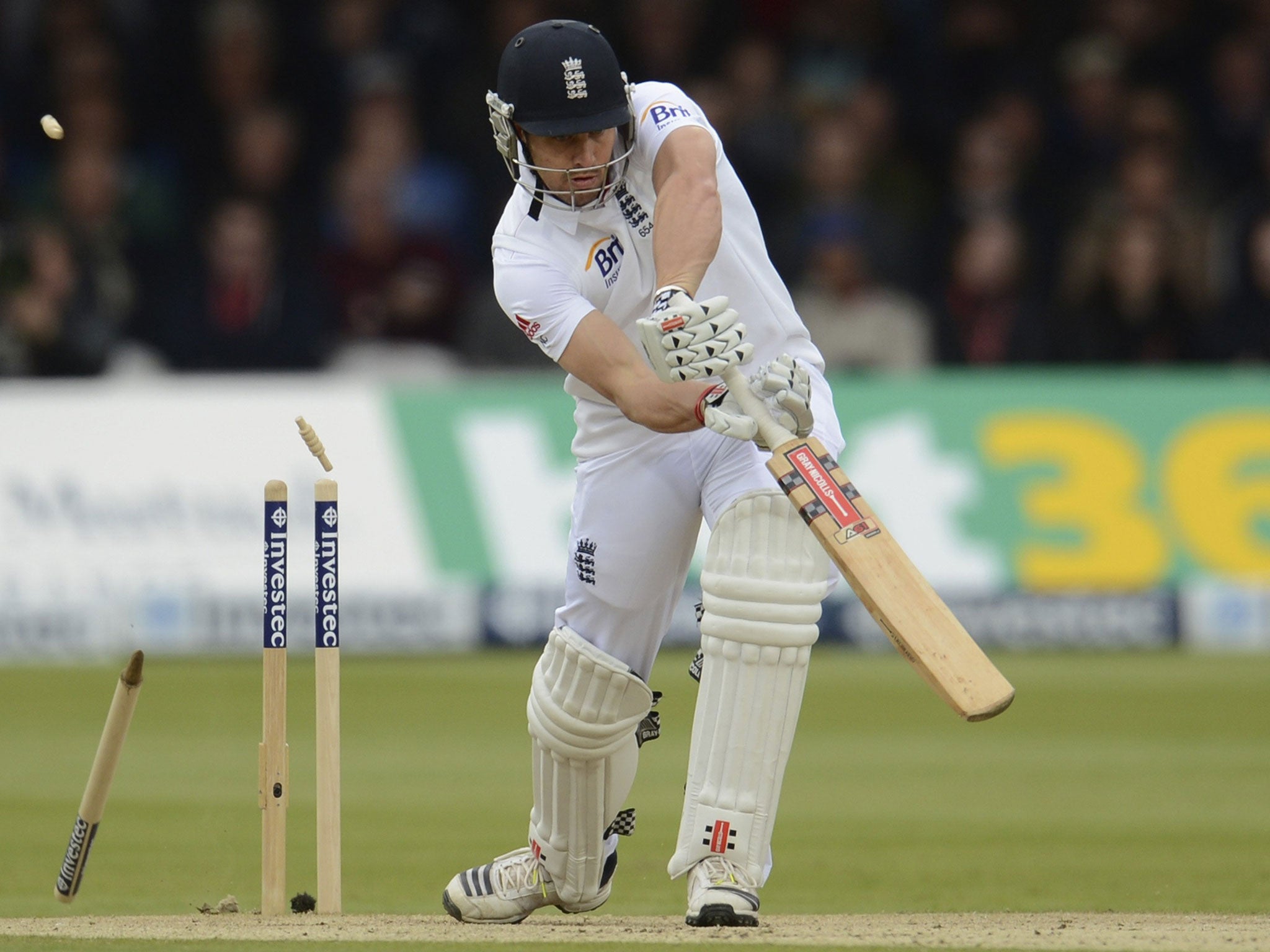The Calvin Report: Nick Compton left facing the cruellest of cuts
England opener's ambition to top the order in Ashes series is under real threat after his failure at Lord's and the impact of team-mate Root

Your support helps us to tell the story
From reproductive rights to climate change to Big Tech, The Independent is on the ground when the story is developing. Whether it's investigating the financials of Elon Musk's pro-Trump PAC or producing our latest documentary, 'The A Word', which shines a light on the American women fighting for reproductive rights, we know how important it is to parse out the facts from the messaging.
At such a critical moment in US history, we need reporters on the ground. Your donation allows us to keep sending journalists to speak to both sides of the story.
The Independent is trusted by Americans across the entire political spectrum. And unlike many other quality news outlets, we choose not to lock Americans out of our reporting and analysis with paywalls. We believe quality journalism should be available to everyone, paid for by those who can afford it.
Your support makes all the difference.History casts an intimidating shadow at Lord's, even on the greyest day. It invites evaluation, demands respect and recognition. As Nick Compton trudged disconsolately back to the venerable Victorian pavilion, the mind's eye envisaged a friendly ghost, striding alongside him. Denis, his grandfather, scored a typically carefree 69 on his last international appearance at cricket's spiritual home, against South Africa in June, 1955. His kneecap, removed the same year, remains a grisly exhibit in the Lord's museum. Some supplicants regard it as a holy relic.
When Nick glanced instinctively, and saw his off-stump cartwheeling after he had made only 15 runs in England's second innings, his sporting life flashed before him. Already burdened by the family name, and assailed by self-imposed pressure to perform at the highest level, he understood the parameters of his problem. It did not matter that he was the victim of a perfect delivery by Neil Wagner.
He must, in all probability, excel in the next Test against New Zealand, at Headingley, or endure a mortifying failure to achieve his ultimate ambition, a place at the top of England's order in an Ashes series.
The compelling ease with which Joe Root batted, as England abandoned their exaggerated respect for the eighth-ranked Test nation, was ominous. He may look like a prepubescent choirboy, but, as far as Compton is concerned, he has an assassin's menace.
The pressure to rush Root to open, implicit when the Middlesex right hander was scoring successive centuries against the Kiwis in the spring, is now explicit. The struggle of Alastair Cook to assert himself alongside Compton will also count against him, if he fails to recover his form. Denis cover drove away the drudgery and austerity of post-War Britain, and headed for the nearest bar to cry freedom. Nick is a product of an age of pre-programmed athletes, who conform to performance strategies and scientific scrutiny.
The regime operated by head coach Andy Flower is, to use football's buzzword of the moment, holistic. Compton has been nurtured carefully, but will be dealt with ruthlessly unless he improves. At 29, there is unlikely to be a way back.
The charge sheet has been underscored here, at Lord's. He is accused of batting too slowly, and of helping to surrender the initiative on the first day, when the return to chloroform cricket, and a scoring rate which hovered at two an over, represented the type of Test match once captured in sepia prints. That is not entirely a bad thing, given the gaudy mediocrity of the IPL, which has been engulfed by the sort of spot-fixing scandal which, sadly, defines modern sport. The Ashes have a primacy that overshadows this series, but it is not without merit.
This is an authentic contest, engrossing without the trite trimmings of a marketing-driven, television-friendly spectacle. The game has evolved at its own pace, and is as comforting as a leather-bound classic, read before a roaring fire in a mahogany-panelled library.
The sight of James Anderson doffing his cap to the capacity crowd at the end of New Zealand's rapidly curtailed first innings, as he walked off with the match ball, and another five-wicket haul, had a reassuring nobility.
Lord's is still a sporting Narnia. A smattering of MCC members temporarily gravitated to the Real Tennis court behind the Pavilion, to watch Jamie Douglas play Connor Medlow in the Gold Racquet challenge, staged on the Saturday of the first Lord's Test each year. Dating back to 1867, it claims to be the oldest singles competition in any form of tennis.
Traditional values endure, although only the terminally naïve believe the current generation of Test players are paragons of virtue. The batsman who walks, without recourse to technology, is now close to being regarded as a conscientious objector. Principled, perhaps, but hardly a team player.
The second ball of England's second innings was a case in point. Cook must have known, deep down, he had got a slight edge on a ball from Trent Boult, at which he fenced from the crease.
Hot Spot was inconclusive, even in super slow motion. Snicko, the other TV toy which registers the soundwaves created by fractional contact, was damning, but inadmissible evidence. England's captain did not appear to have any trouble in dealing with his deceit. The original decision of umpire Steve Davis, that he was not out, stood after several minutes conjecture.
Though the Australians are imploding, they will surely respond to the slur they are unfit to wear the baggy green. As for Compton, he must pray he is around to share, even enhance, their discomfort.
Grandad had the best advice when confronted by uncertainty: "Oh for heaven's sake, hit the bloody thing."
Join our commenting forum
Join thought-provoking conversations, follow other Independent readers and see their replies
Comments